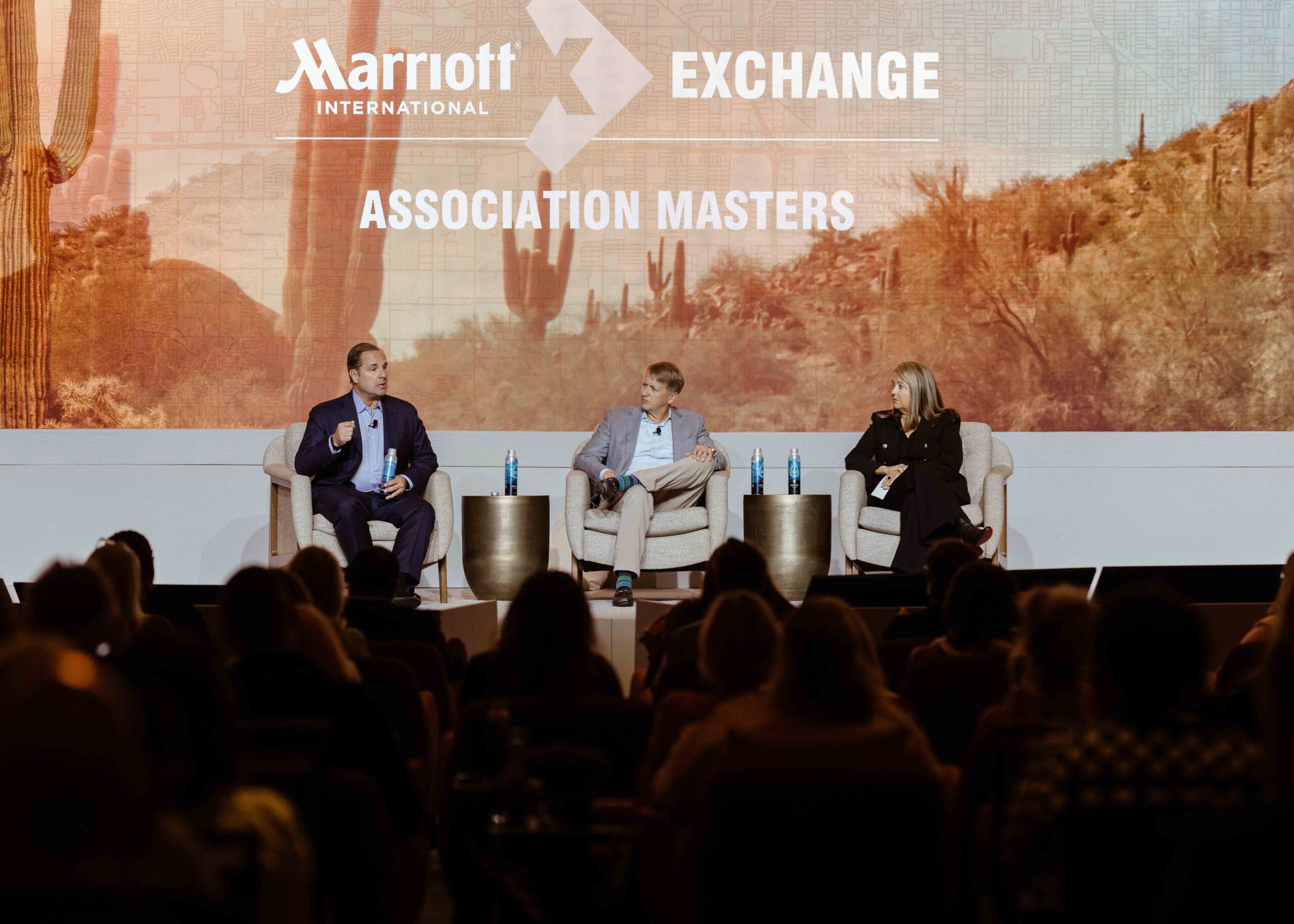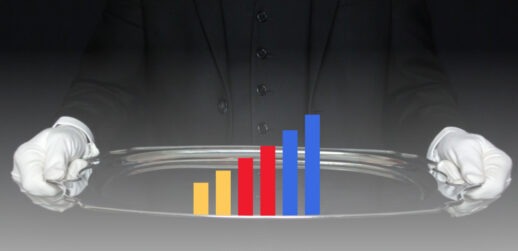Why Marriott CEO Tony Capuano is not expecting a hospitality downturn, especially in meetings
Marriott International’s Exchange Association Masters customer event at the flagship renovated Sheraton Phoenix Downtown last week was an opportunity for meeting planners to ask top Marriott leaders what they could expect from the company in the future and talk about what they had been through together.
Marriott International President and CEO Tony Capuano kicked off the event by thanking the 314 association planner customers for sticking with the company and helping the hospitality industry recover so quickly. He added that despite some predictions of a recession, he just isn’t seeing it in the data. “When we look at our forward bookings, particularly in the group segment, which has been remarkably strong, we’re just not seeing it, yet.”
Capuano softened his statement by saying the booking windows are shorter than in past years, but he also referred to three other trends that could bode well for hotels and events: a shift away from buying goods towards investing in experiences that have expanded to all generations, a desire to explore (and post pictures on social media of) the world, and an increase in the percentage of conference and business travelers who are extending their stays for leisure.
The return has been uneven depending on the region and the industry. Marriott’s Chief Sales and Marketing Officer for the U.S. and Canada Julius Robinson clarified that banking, finance and medical groups are returning with more small, regional meetings. After some rocky years, urban cities are returning to strong occupancy again as well. “You can’t look at the headlines; you have to understand what is happening in your local community,” he said.
All of these changes require new responses for the almost 100-year-old hospitality company. Marriott International’s third board chair in the company’s 96-year history, David Marriott, explained at the opening session that the company is focused on technology, growth, sustainability and DEI.
Belonging: An Expanded Definition of DEI
 The pledge to embody DEI started at the board level where Marriott pledged that as board members age out, he would be replacing them with diverse, talented, international business leaders who embody environmental, social and governance principles. Marriott stepped into the role his father vacated in February 2022. At the same meeting, Isabella “Bella” D. Goren, former chief financial officer with American Airlines, was appointed to the board’s audit committee.
The pledge to embody DEI started at the board level where Marriott pledged that as board members age out, he would be replacing them with diverse, talented, international business leaders who embody environmental, social and governance principles. Marriott stepped into the role his father vacated in February 2022. At the same meeting, Isabella “Bella” D. Goren, former chief financial officer with American Airlines, was appointed to the board’s audit committee.
“The other thing we’re trying to do with the board is to bring [employees] closer to our culture and our core values and help them understand our business better,” he said. “We want board members with varying backgrounds, different understandings that can challenge the management team, challenge one another in the board room and help us become better.”
The very definition of diversity was being expanded beyond what you could see, however. A panel led by Marriott Vice President of Global B2B Evens and Programs Glenn Stress featuring Marriott Senior Vice President of Multicultural Affairs, Social Impact and Business Councils Apoorva Gandhi and Smart Women in Meetings Award winner and Google Global Events Strategy lead Megan Henshall summed the meaning of DEI as welcoming the full personhood of everyone connected to an event with all of their strengths, talents and disabilities.
Read More: Why is DEI Critical to the Hospitality Industry?
Henshall shared learnings from her recent Google Xi Days and the Nue Project she started to better meet the needs of neurodiverse people, demystify and normalize speaking a culturally sensitive language. “In effect, this is a love letter to everyone who doesn’t love forced fun at a networking event,” said Henshall.
Ghandi also talked holistically about how Marriott is working to diversify supplier partners to build economic security and innovation. “That leads to welcoming all guests,” he said.
Technology: Removing Friction from the Hotel Stay
Marriott has been investing in the Marriott Bonvoy app since it was created as part of the Starwood merger in 2019. It now allows members to book hotel rooms, check-in, access mobile keys, “unlock experiences” and “have the world in the palm of your hand.”
“We are constantly looking for ways to drive efficiency, to remove friction from the guest experience, to make the working environment more appealing for prospective future associates and to drive efficiency for our owners,” said Capuano.
Robinson called the company’s technology advances a journey that includes replacing the company’s property management and reservation systems. “We’re rebuilding our infrastructure for the future to support all this personalization,” he said. It should be able to combine customer requests with data from previous stays to create better end-products.
The end goal is for Marriott to have its own ecosystem that includes partnerships with Uber and others that make everything associated with a stay seamless. That could include changing credit cards mid-stay when switching from business to pleasure. And, of interest to many of the meeting planners present, integrating billing to make it more user-friendly.
In January, Marriott announced that instant booking would be available through GroupSync Marketplace in the U.S. and Canada. The partnership with Groups 360 allows for Expedia-like experiences booking simple meetings based on real-time inventory available in the system.
“One thing that we have been really pleasantly surprised about is that association of customers have been interested in trying to use some of this product,” said Robinson.
While he predicted that the product will grow beyond the current 1,500 properties and could even handle more complex transactions in the future, the traditional RFP is not going away any time soon.
31 Hotel Brands: A Growing Footprint
A month ago, Marriott announced that it was acquiring the limited-service, Latin American brand City Express for $100 million, making City Express by Marriott functionally the 31st brand for the company by August. The deal made Marriott the largest hotel company in the Caribbean and Latin America. Capuano explained the logic behind the deal and his litmus test for future deals this way: “I don’t feel a burning need to do transactions to gain scale simply for the sake of gaining scale.” Instead, he looks at the company’s geographic and service footprint and if he sees gaps in either of those that the company can’t fill organically, then he considers a transaction.
Read More: Marriott International’s ‘Meet with Momentum’ Keeps Growing—Here’s Why
“I love the breadth of choice that our portfolio offers to our guests and our owners and franchisees,” he said. “We want to make sure you never need to look outside our ecosystem for every type of meeting that you plan.
In addition to buying brands, new Marriotts are also opening around the world. Gaylord Pacific is set to debut in 2025 in Chula Vista, California, seven miles from San Diego with 1,600 guest rooms and more than 477,000 sq. ft. of meeting space.
And the Sheraton renovation that started with Phoenix is continuing with 17 underway in the U.S. and Canada. A similar refresh is in the works for the W brand starting with W New York Union Square.




